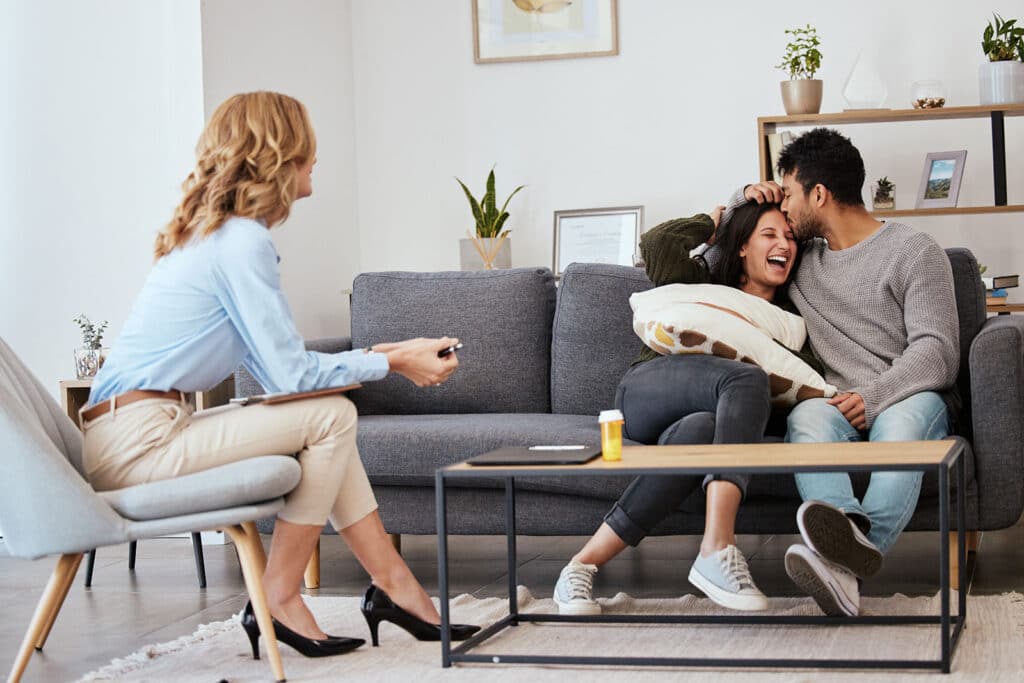Interesting fact: around 70-80% of couples who’ve had couples therapy or counseling of any kind are less likely to end the relationship than those who haven’t. The numbers show how effective couples therapy can be.
Other research shows a staggering 80% of males in couples refuse to attend therapy, with the females pushing them to go. There’s a lot of shame and speculation circling the idea of couples therapy which we plan to debunk today.
In this post, you’ll learn what couples therapy helps with, how it works, what its principles are, and how much it typically costs. Let’s change your mind and save your relationship.

Table of Contents
What Does Couples Therapy Help With?
Couples counseling helps address the stressors in your relationship. A couples therapist will create a safe space for you and your partner to talk about these stressors and work on them.
The therapist has to dig deeper, find the root causes of these relationship issues, and solve them. Be mindful that this isn’t an immediate fix. The goal of couples therapy is to create long-term relationship dynamics that last outside of therapy.
So, let’s take a look at some of these issues that couples therapy can help with:
Miscommunication or Lack of Communication
65% of couples that break up state miscommunication as the top reason. Couples should seek counseling before miscommunication becomes a problem.
A couples therapist understands the pain and frustration that comes when partners feel unheard or misunderstood. In a caring, non-judgmental environment, you and your partner will learn to express yourselves clearly and listen with empathy.
As a couple, you’ll discover new ways to navigate disagreements and come together, instead of apart. Research confirms this too. It shows that couples who improve communication skills have higher relationship satisfaction.
Growing Apart or Separation
It’s heartbreaking when the person you committed to feels like a stranger. The therapist will help you explore, with compassion, the underlying reasons you’ve grown distant. The reasons vary. It could be due to work, child-rearing, or other life stressors.
With therapy’s help, you’ll rebuild the positive connection that brought you together initially. For some, this renewed closeness and understanding prevents separation. When that’s not possible, counseling provides a supportive transition.
Aftermath of Addiction or Trauma
Has your partner recently relapsed or gone through rehabilitation for an addiction? Have you been affected by their substance abuse disorder? Alternatively, do they suffer from PTSD or another form of trauma?
These are considered relationship stressors as well. Healing from them can be extremely challenging without the right help. Your therapist will guide you through this tender process at a pace comfortable for you both.
You’ll gain tools to safely share the pain, rebuild trust, and eventually intimacy. The goal here is to recreate a foundation of care, respect, and integrity—one where your bond not only recovers but deepens.
Financial Stress
Money concerns can crack even the strongest partnerships. In America, it’s the leading cause of divorces, with over 20-30% of married couples ending the relationship due to financial stress.
Couples counseling offers a respectful space to lay it all out – income, expenses, and attitudes about finance shaped by your background. The therapist will facilitate tough (but crucial) conversations about fiscal responsibilities and future goals.
Therapy helps you regain the teamwork essential for money management and prevention of future financial conflicts.
Lack of Intimacy or Trust
Nothing harms a relationship more than a lack of intimacy and trust. When partners feel disconnected emotionally and physically, it’s painful for both people.
In this case, your therapist will help you understand what has blocked intimacy and eroded trust in a safe space. You’ll learn to reopen communication about this vulnerable topic.
Guided by the therapist, you can restore meaningful emotional and physical intimacy at a pace you’re comfortable with. In another research, the study showed that increased intimacy elevated relationship quality.

How Does Couples Therapy Work?
The above relationship distresses shouldn’t go unaddressed for long. Disconnection, miscommunication, and lack of problem-solving skills can affect your relationship wellness in the long run.
Here’s what to expect from a couples therapy session. Note, however, that counseling doesn’t have to follow this exact format. A licensed therapist would consider the complexity and needs of your relationships beforehand.
Getting to Know Your Partner
Even long-term partners fall out after a while. Guided conversations in couples therapy provide a safe space to share your individual backgrounds, values, hopes, and fears.
You’ll also gain a deeper understanding of your partner’s inner world. Who knows? You may find enlightening explanations for longtime behaviors or recurring conflicts.
Discussing Past Relationships
All couples bring emotional baggage from previous relationships into their current one. In therapy, you can unpack how your past experiences shape your expectations and concerns.
Understanding the origins of insecurities and unhealthy patterns allows you to prevent repeating past hurts. You’ll develop boundaries to create a healthier dynamic with your loved one.
Building Conflict Resolution Skills
Conflict is inevitable – but what matters is how you navigate these disagreements. Couples counseling equips you with techniques for expressing anger constructively and resolving issues with empathy.
You’ll learn to distinguish between solvable and perpetual problems. With your therapist’s guidance, you’ll have productive dialogues about difficult topics.
Highlighting Positive Changes
Therapy doesn’t work if you’re not aware of the positive steps you’re each making toward better communication, understanding, and intimacy. These positive interactions instill hope in both partners for continued growth. It’s how you develop a healthy, satisfying, long-term relationship.

What Are the Principles of Couples Therapy?
Below is the most technical part of our post. In this section, we dig deeper into just some of the most common approaches used in couples therapy.
The Gottman Method
One prominent approach in couples therapy is the Gottman Method. The technique emphasizes identifying and interrupting negative communication patterns that damage relationships.
Through therapy sessions, couples learn to express their needs and concerns respectfully. This fosters empathy and understanding.
The Gottman Method also helps couples build friendship and intimacy by rediscovering shared interests and strengthening emotional connection.
Cognitive Behavioral Therapy (CBT)
CBT is a type of psychotherapy that’s applied in relationship counseling. CBT identifies how our brain works, specifically how thoughts and beliefs influence behaviors and emotions. In relationship therapy, CBT helps couples recognize how their thought patterns contribute to conflict.
By challenging negative thought patterns and developing healthier coping mechanisms, coupes can improve communication and problem-solving skills. This leads to a more positive and healthy relationship.
Emotion-Focused Therapy (EFT)
EFT is a form of therapy that focuses on the role of emotions in stable relationships. It helps couples identify and express their underlying emotional needs (such as security, connection, and validation).
During counseling sessions, therapists guide couples in recognizing and managing their emotions in a healthy way. In turn, this fosters empathy and emotional responsiveness. It also promotes deeper intimacy and a stronger sense of well-being for both partners.
What Are the Benefits of Couples Therapy?
Relationship counseling offers a range of benefits that can improve your relationship’s well-being while improving your mental health regarding your relationship issues.
For instance, couples therapy helps partners gain the skills for assertive communication and active listening. They gain a deeper understanding of both themselves and their partner.

Therapists also help couples develop healthy interventions to address root causes. Additionally, they provide valuable tools for tackling problems as a team. Couples learn to brainstorm solutions and reach compromises.
Another benefit is increased intimacy. Couples therapy strengthens the foundation of friendship and secure attachment. You fall in love with your partner all over again and deepen your emotional connection with them.
How Much Does Couples Therapy Typically Cost?
Couples therapy can be a valuable investment in your relationship’s health. That said, you should understand the cost upfront.
For starters, the price tag can vary depending on whether you choose in-person or online sessions. Several other factors come into play too.
- Location: Where you live determines the cost per hour. Therapists in high-cost-of-living areas will typically charge more than rural areas.
- Therapist Experience: Therapists with extensive experience and specialized credentials command higher fees compared to newer practitioners.
- Online vs. In-Person: Online therapy platforms often offer subscription models, making them more affordable.
- Session Duration: Therapy sessions can range from 45 minutes to 2 hours, with the average being 50-55 minutes. Couples therapy often involves a 12-week commitment.
Take the Initiative to Save Your Relationship
It doesn’t have to end. If you and your partner truly love each other and are meant to be, you’ll give your relationship every chance it needs to get better. Equipped with the right set of skills, you’ll increase relationship satisfaction and intimacy.
Let our staff at Recreate Life Counseling guide the way. Our licensed therapists have the necessary tools to save your relationship or marriage. Your race, sexual orientation, religion, or otherwise, don’t matter either. We only see people that need help so we help them.
Please contact Recreate Life Counseling for additional information about Couples Therapy near you.



